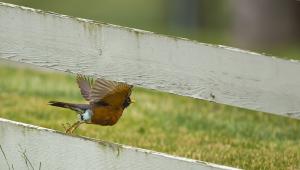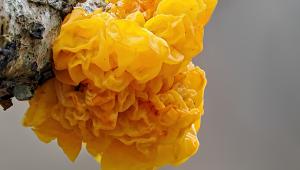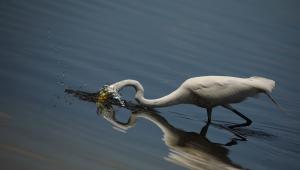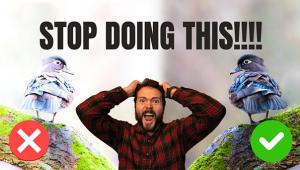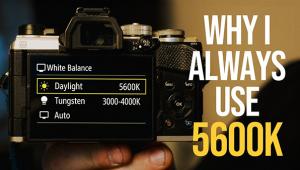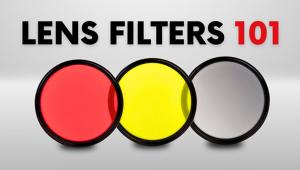The Future Of The Future
In this issue we ask our contributors to pose their thoughts about the future
of photography, at least looking forward a year. As is their wont, each has
a particular revelation, wish, or projection based upon their sense of optimism
(or lack of it) and field of expertise. You'll read echoes of nostalgia
for film photography, thoughts on what needs to change to make things easier
and better, and some wild ideas about image sharing that might indeed be in
the works.
 It recently struck me that progress and evolution are not necessarily or entirely
positive things. Indeed, evolution can be a rather nasty affair, leaving perfectly
valid modes of living or behaving in the dust for more efficient forms of reproduction
and survival. Not to generalize too much, but the evolution from film to digital
is a case in point. There was nothing inherently wrong with film photography;
indeed, it remains a perfectly fine way to capture images. It's just that
digital photography posed, in most cases, a more efficient form of reproducing
and sharing images, and for some folks, was a more economical way to operate
as well. The speed with which digital took hold speaks to its inherent "sense"
in terms of evolution, and how it fits into a pattern of change that, yes, is
market driven, but also occurred because it met a need and supplanted technology
that developed that need but could readily adapt to the newer forms of reproduction
(with the communication of information being the mode of reproduction).
It recently struck me that progress and evolution are not necessarily or entirely
positive things. Indeed, evolution can be a rather nasty affair, leaving perfectly
valid modes of living or behaving in the dust for more efficient forms of reproduction
and survival. Not to generalize too much, but the evolution from film to digital
is a case in point. There was nothing inherently wrong with film photography;
indeed, it remains a perfectly fine way to capture images. It's just that
digital photography posed, in most cases, a more efficient form of reproducing
and sharing images, and for some folks, was a more economical way to operate
as well. The speed with which digital took hold speaks to its inherent "sense"
in terms of evolution, and how it fits into a pattern of change that, yes, is
market driven, but also occurred because it met a need and supplanted technology
that developed that need but could readily adapt to the newer forms of reproduction
(with the communication of information being the mode of reproduction).
Is the changeover to digital "positive"? Does it contribute to the betterment of photographers and imaging? On the practical side there's little debate that digital imaging has opened up an entirely new method of dealing with images that can be challenging but is certainly more creative for more people than film. The idea that quality prints could only be made by a small set of darkroom workers or those who could afford custom labs is now finished. The method of sharing images with the world for fun or for business has changed completely, with more photographers having worldwide gallery space on the web. And the use of image for communication, from blogs to public sharing sites like the Galleries at www. shutterbug.com, has changed the way we communicate about our local family and the family of the world at large.
So yes, digital has changed the game in a positive manner. But with evolution always comes some sense of loss. There are certainly attributes to film that digital lacks or lacked when it first arrived on the scene. But overall it's difficult for anyone shooting digital to think about returning to film; indeed, there's a whole generation of photographers coming up who look at you funny if you ask them if they have ever shot film. "Why would you do that?" the look seems to say.
Just because a technology is the "way" of the future does not mean that that which it supplanted is going away. I have a bike and car but still enjoy walking to where I need to go. I cook on a stove but enjoy doing so over a campfire just as much. I shoot with digital but also enjoy the occasional roll of film. There are no rules to all this or proclamations as to how you should enjoy your photography. It's still a pluralistic society and market, thank goodness, and it's up to each of us to decide how we take care of our creative imaging needs.
Speaking of the future of the future, our next issue will include our report on photokina, the worldwide show where those products that will be arriving next year, and prototypes that might be available in years ahead, are showcased. There will be some items that may surprise you, and some startling new technology, so don't miss it!

 It recently struck me that progress and evolution are not necessarily or entirely
positive things. Indeed, evolution can be a rather nasty affair, leaving perfectly
valid modes of living or behaving in the dust for more efficient forms of reproduction
and survival. Not to generalize too much, but the evolution from film to digital
is a case in point. There was nothing inherently wrong with film photography;
indeed, it remains a perfectly fine way to capture images. It's just that
digital photography posed, in most cases, a more efficient form of reproducing
and sharing images, and for some folks, was a more economical way to operate
as well. The speed with which digital took hold speaks to its inherent "sense"
in terms of evolution, and how it fits into a pattern of change that, yes, is
market driven, but also occurred because it met a need and supplanted technology
that developed that need but could readily adapt to the newer forms of reproduction
(with the communication of information being the mode of reproduction).
It recently struck me that progress and evolution are not necessarily or entirely
positive things. Indeed, evolution can be a rather nasty affair, leaving perfectly
valid modes of living or behaving in the dust for more efficient forms of reproduction
and survival. Not to generalize too much, but the evolution from film to digital
is a case in point. There was nothing inherently wrong with film photography;
indeed, it remains a perfectly fine way to capture images. It's just that
digital photography posed, in most cases, a more efficient form of reproducing
and sharing images, and for some folks, was a more economical way to operate
as well. The speed with which digital took hold speaks to its inherent "sense"
in terms of evolution, and how it fits into a pattern of change that, yes, is
market driven, but also occurred because it met a need and supplanted technology
that developed that need but could readily adapt to the newer forms of reproduction
(with the communication of information being the mode of reproduction). Is the changeover to digital "positive"? Does it contribute to the betterment of photographers and imaging? On the practical side there's little debate that digital imaging has opened up an entirely new method of dealing with images that can be challenging but is certainly more creative for more people than film. The idea that quality prints could only be made by a small set of darkroom workers or those who could afford custom labs is now finished. The method of sharing images with the world for fun or for business has changed completely, with more photographers having worldwide gallery space on the web. And the use of image for communication, from blogs to public sharing sites like the Galleries at www. shutterbug.com, has changed the way we communicate about our local family and the family of the world at large.
So yes, digital has changed the game in a positive manner. But with evolution always comes some sense of loss. There are certainly attributes to film that digital lacks or lacked when it first arrived on the scene. But overall it's difficult for anyone shooting digital to think about returning to film; indeed, there's a whole generation of photographers coming up who look at you funny if you ask them if they have ever shot film. "Why would you do that?" the look seems to say.
Just because a technology is the "way" of the future does not mean that that which it supplanted is going away. I have a bike and car but still enjoy walking to where I need to go. I cook on a stove but enjoy doing so over a campfire just as much. I shoot with digital but also enjoy the occasional roll of film. There are no rules to all this or proclamations as to how you should enjoy your photography. It's still a pluralistic society and market, thank goodness, and it's up to each of us to decide how we take care of our creative imaging needs.
Speaking of the future of the future, our next issue will include our report on photokina, the worldwide show where those products that will be arriving next year, and prototypes that might be available in years ahead, are showcased. There will be some items that may surprise you, and some startling new technology, so don't miss it!

- Log in or register to post comments






